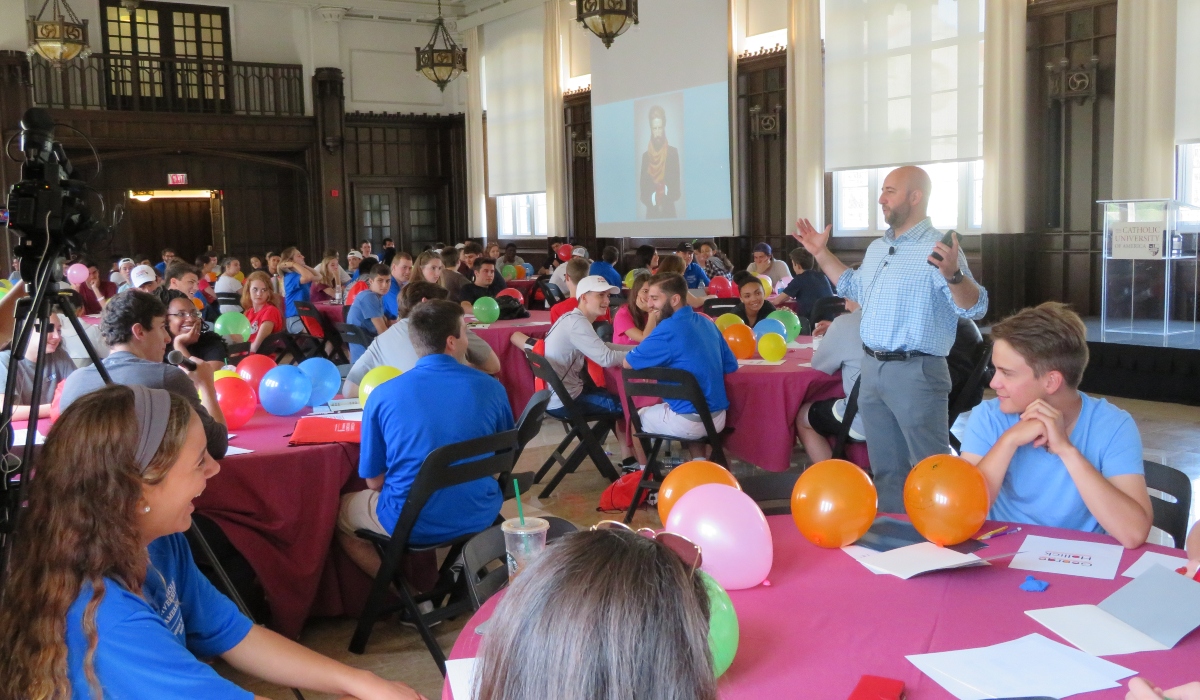

In 2020, the Ciocca Center for Principled Entrepreneurship in the Busch School of Business launched a college-level course for Catholic high schools to introduce students to business and entrepreneurship from a Catholic perspective. Students in the program can earn dual-enrollment credit that counts toward their college career.
CEDE, or Catholic Entrepreneurship and Design Experience, is driven by experiential and project-based learning. “We believe that a spirit of freedom and play are critical to the entrepreneurial journey,” says Luke Burgis, director of programs at the Ciocca Center.
The program is built upon the business school’s popular Vocation of Business course. Combining academic rigor with fun and engaging action, CEDE is organized into 3 phases: discern, create, and grow. It features a broad and widely-applicable call to an entrepreneurial spirit that will serve all students, whether they become business people, teachers, parents, priests, or religious brothers or sisters.
The course has 12 foundational modules covering such topics as design thinking, the business model canvas, lean startup methodology, and leadership principles. Students are challenged to demonstrate their learning by completing projects that create real human value.
In module 3, “A Bigger Slice of Life,” students are challenged to create and serve a meal using a fixed budget and culinary creativity.
“I liked the economic approach when I was given the job of cooking dinner for my family,” said student Gianna. “I had a lot of fun completing this task as it was both challenging and required a sufficient plan. I also enjoyed starting this class out with the retirement speeches. I found it challenging, very challenging and it made me ready for the rest of the program, setting my standards high.”
In module 5, “Freedom To Be More,” students create their own “Growing In Virtue” plan that helps them connect their Catholic vocation to their business avocation. The CEDE program connects fundamental business concepts with Catholic Social Teaching, linking them to scripture, the Catechism, profiles and case studies of entrepreneurs, as well as the lives of the saints.
Through the CEDE program, students can earn up to three concurrent credits in the business school. Program courses take place either in a high school (led by teachers who’ve completed CEDE facilitator training), or self-directed in the home for students who are homeschooled. In both cases, students seeking concurrent credit submit their capstone deliverables to the staff of the Ciocca Center to be graded according to the academic standards of the Busch School.
"The facilitator training and ongoing formation opportunities have been excellent, allowing my colleagues and me to understand all that CEDE has to offer Frassati Catholic High School,” says Sister Elizabeth Marie Kalscheur, O.P., chair of the Ethics and Culture Department at Frassati Catholic High School in Spring, Texas. “We love that CEDE is not just ‘another program,’ but a way to improve and build on what our school is already doing to form agents of change for our culture.
“Members of CEDE's staff have been so generous in offering their time, expertise, and resources. With their help, we have been able to begin incorporating elements of CEDE in our senior capstone course, and these activities and materials have been incredibly helpful to our students. Because of CEDE, we are even more confident that our students will graduate prepared to be life-long entrepreneurs, bringing Christ to the problems and needs of their time, just as Blessed Pier Giorgio Frassati did in his."
Seven Catholic schools across the country are currently participating. The program will be expanding to a maximum of 20 schools for Fall 2021. The Ciocca Center is evaluating applications between now and the end of June.
Teachers or administrators who are interested in bringing the program to their school, or parents and students who would like to participate in the homeschool program, can learn more on the program website or can contact Jon Bachura at bachura@cua.edu.